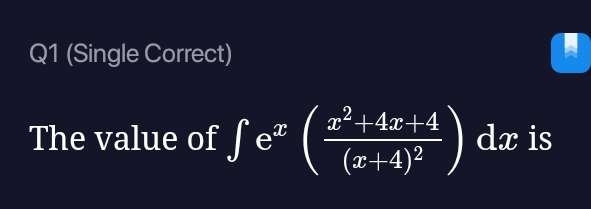AI tutor
Full solution
Q. The value of is
- Simplify the integrand: Let's simplify the integrand first. Notice that is the expansion of . So, we rewrite the integral as .
- Perform substitution: Now, let's do a substitution. Let , then and . Substitute into the integral to get .
- Expand the numerator: Expand the numerator to get .
- Split the integral: Split the integral into three parts: .
- Calculate the first integral: The first integral is straightforward, it's , which simplifies to .
- Calculate the second integral: The second integral is a bit tricky, but we can use integration by parts or look it up as a standard integral. It's , where is the exponential integral.
- Calculate the third integral: The third integral is also not standard, but we can use integration by parts. Let's set , , and , . Then we get .
- Calculate the third integral: The third integral is also not standard, but we can use integration by parts. Let's set , , and , . Then we get .After calculating, we get , which simplifies to .

